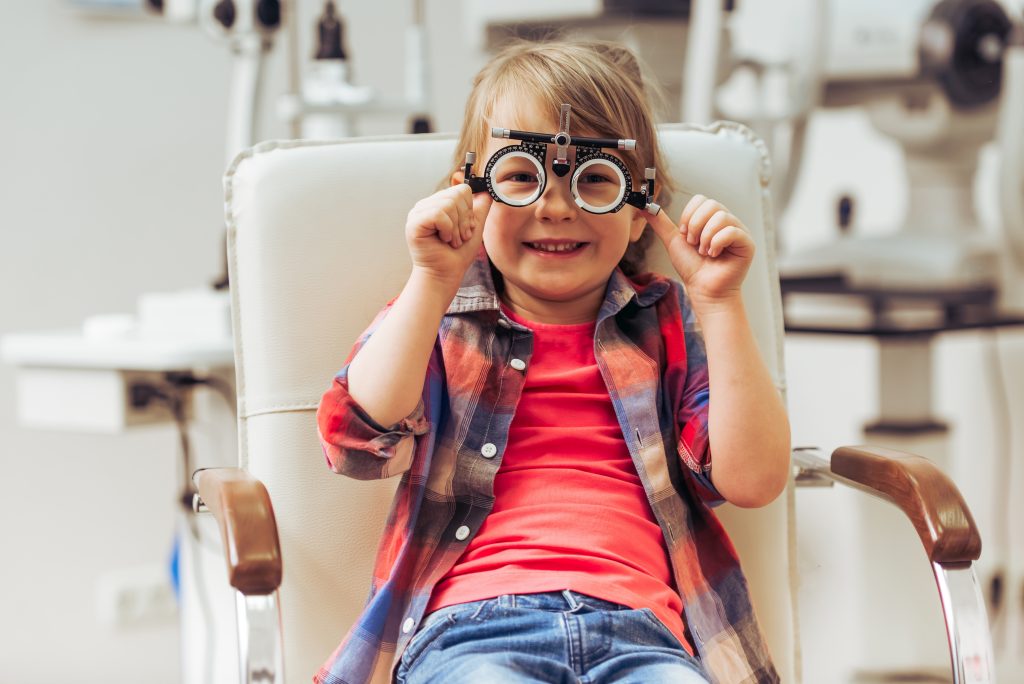How Do I Take Care of My Child's Eyes?

Educating children at a young age about eye care is crucial to maintaining long-term, high quality vision. If you introduce your child to healthy practices in their early years, they are more likely to develop habits that will protect their eyes and preserve their vision throughout their life.
Many of the lessons about proper eye care are very practical and have no financial cost. Healthy habits can save you or your child thousands of dollars from potential future medical procedures. Below is a quick guide on how you can take care of your child's eyes.
Build Healthy Lifestyle Habits
Nothing preserves the senses—hearing, feeling, tasting, smelling and seeing—better than healthy living. There are several health habits your child can pick up early to preserve their vision.
- Establish and maintain a healthy diet.
- Exercise daily and spend time outside.
- Get plenty of sleep each night.
- Avoid smoking and alcohol.
- Learn how to handle stress properly.
When your child understands how to live healthily, they will also experience the benefits of improved sight. A healthy lifestyle is something that they can carry into adulthood.
Schedule Routine Eye Exams
You can schedule your child's first eye exam when they are an infant. You can then establish a routine of scheduling exams according to your doctor's recommendations. Eye exams identify potential problems that can impact your child's vision early on or cause harm later in life.
A routine eye exam is quick and simple, but it can be intimidating for your child at first. However, as they visit the doctor more, they will better understand the value of eye exams. Those who start routine eye exams as children are more likely to continue this practice throughout their adulthood.
Identify and Report Any Issues as They Happen
Children do not always know how to tell you what is wrong with their eyes. Often, they may not entirely realize that what they are experiencing is an actual medical problem. Months, or even years, could go by before your child finally tells you that they have an eye problem.
Therefore, you and your eye doctor can educate your child on how to recognize a problem and report it immediately. Some issues your child may share with you include:
- Pain or discomfort
- Dizziness or headaches
- Chronic blurriness
- Injuries
- Itchiness or red eyes
- Sudden blindness
Teach your child the value of reporting problems as they occur, rather than waiting until they get worse. By educating your child, you may help prevent serious issues that could damage their vision if left untreated.
Use Eyewear Properly
If your child requires prescription eyewear such as glasses or contacts, they must learn to use the eyewear properly. Improper usage can create further eye damage, causing your child to need more powerful eyewear or undergo a procedure. Some basic tips on proper use include:
- Wash hands before inserting or removing contacts.
- Clean the glasses lenses before or during usage.
- Use the right solution for contacts.
- Don't wear contacts to bed.
- Report any pain or irritation associated with the eyewear.
- Don't wear reading glasses for regular use.
- Don't wear someone else's glasses.
- Take care of the eyewear—protect it from harm.
Reduce Screen Time
One important thing you can teach your child about is computer vision syndrome. This condition occurs when your child spends too much time in front of a computer, smartphone or tablet. It can also occur as a result of using screens improperly. Your child needs to understand that there is a direct link between too much screen time and vision problems such as nearsightedness, eye strain, eye pain, dry eyes and astigmatism.
Once your child becomes more aware of these potential vision problems, you can work with them to establish appropriate habits for screen time. For instance, work out a schedule for being on their devices so that their screen exposure is limited. Also, create a healthy environment with sufficient lighting.
Wear Sunglasses Outside on Sunny Days
If you encourage your child to spend more time outside, you may want to purchase a pair of sunglasses to protect their eyes. A pair of prescription sunglasses can prevent eye conditions such as macular degeneration, cataracts and pterygium, which occur from too much exposure to UV rays.
When shopping around for sunglasses, don't buy cheap products for your kids. Cheap sunglasses do not provide adequate protection from the sun. Ensure the glasses offer 100 percent UV protection and provide full coverage over the eyes. Also, let your child choose their favorite style. They're more likely to wear their shades if you give them a choice.
Schedule an Eye Exam Today
Contact the Gulf Coast Vision Center at one of our Pace, Milton, or Crestview locations or at one of our Pensacola locations on Nine Mile or in East Hill to schedule a comprehensive eye exam today.
